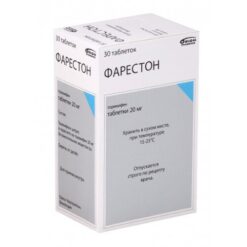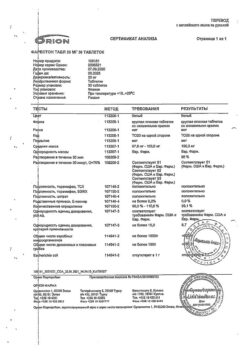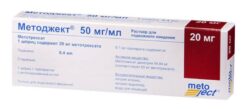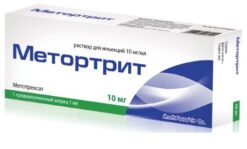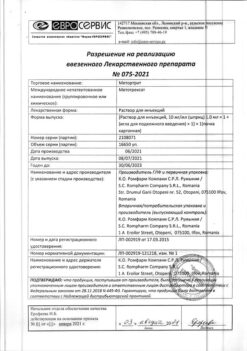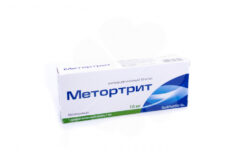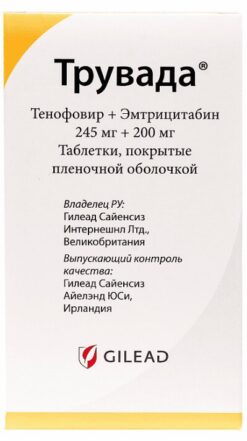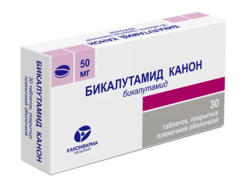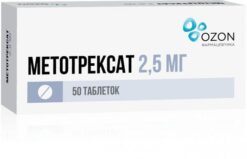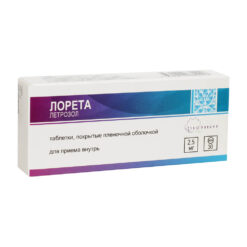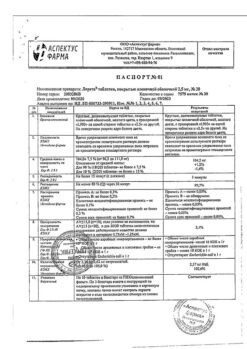No products in the cart.
Description
Antitumor agent of plant origin, also has immunosuppressive effect.
The specific inhibitor of DNA topoisomerase I, causes single linear DNA lesions, disrupts DNA replication.
The cytotoxic activity is time-dependent and specific for S phase.
Indications
Indications
In monotherapy in patients with disease progression after standard antitumor therapy; in combination with fluorouracil and calcium folinate in patients who have not previously received chemotherapy.
Pharmacological effect
Pharmacological effect
An antitumor agent of plant origin, it also has an immunosuppressive effect.
A specific inhibitor of DNA topoisomerase I, causes single linear DNA lesions and disrupts DNA replication.
Cytotoxic activity is time dependent and S phase specific.
Special instructions
Special instructions
Treatment with Irinotecan-Teva should be carried out in specialized chemotherapy departments under the supervision of a physician experienced in working with anticancer drugs.
In patients receiving the drug Irinotecan-Teva, it is necessary to do a detailed clinical blood test weekly and monitor liver function. Diarrhea that occurs as a consequence of the cytotoxic effect of the drug (delayed diarrhea) is usually observed no earlier than 24 hours after administration of Irinotecan-Teva (in most patients, on average after 5 days). When the first episode of loose stool occurs, it is necessary to prescribe plenty of fluids containing electrolytes and immediately carry out antidiarrheal therapy, including taking high doses of loperamide (4 mg at the first dose and then 2 mg every 2 hours).
This therapy is continued for at least 12 hours after the last episode of loose stool, but not more than 48 hours due to the possibility of developing paresis of the small intestine. If diarrhea is assessed as severe (more than 6 episodes of loose stools per day or severe tenesmus), and if it is accompanied by vomiting or fever, the patient should be urgently hospitalized for comprehensive treatment, including the administration of broad-spectrum antibiotics. For moderate or mild diarrhea (less than 6 episodes of loose stools per day and moderate tenesmus), which does not stop within the first 48 hours, it is necessary to start taking broad-spectrum antibiotics orally, and it is recommended to hospitalize the patient.
If diarrhea and severe neutropenia (white blood cell count less than 500 cells/μl of blood) occur simultaneously, broad-spectrum antibiotics are prescribed orally in addition to antidiarrheal therapy for prophylactic purposes. Loperamide should not be administered prophylactically, including to patients who have had diarrhea during previous administrations of Irinotecan-Teva.
The patient must be warned in advance about the possibility of developing delayed diarrhea. Patients should immediately inform their doctor if diarrhea occurs and begin appropriate treatment immediately.
If diarrhea is not adequately treated, a life-threatening condition may develop, especially if diarrhea develops against the background of neutropenia.
Patients with febrile neutropenia (body temperature > 38°C and neutrophil count < 1000 cells/μl) should be promptly started on broad-spectrum antibiotics in a hospital setting.
With the development of acute cholinergic syndrome, the signs of which are the appearance of early diarrhea and a combination of symptoms such as sweating, cramping abdominal pain, lacrimation, miosis and increased salivation, in the absence of contraindications, the appointment of 0.25 mg of atropine subcutaneously is indicated. Caution should be exercised when using the drug in patients with bronchial asthma. In patients with a history of indications for the development of acute cholinergic syndrome, including severe forms, prophylactic administration of atropine is recommended before prescribing Irinotecan-Teva.
Before each cycle of therapy with Irinotecan-Teva, prophylactic administration of antiemetic drugs is recommended.
Since the dosage form of the drug contains sorbitol as an excipient, Irinotecan-Teva cannot be used in patients with hereditary fructose intolerance.
The simultaneous administration of inhibitors (ketoconazole) or inducers (rifampicin, carbamazepine, phenobarbital, phenytoin, St. John’s wort) of the CYP3A4 isoenzyme should be avoided due to changes in the pharmacokinetics of irinotecan.
During treatment with Irinotecan-Teva and for at least 3 months after discontinuation of therapy, reliable methods of contraception should be used.
When preparing a solution of the drug Irinotecan-Teva and handling the drug, as well as when using other antitumor drugs, care should be taken. It is necessary to use gloves, a mask and goggles.
If irinotecan solution or infusion solution comes into contact with your skin, wash it immediately with soap and water. If irinotecan or its solution comes into contact with mucous membranes, rinse them immediately with water.
All materials used for the preparation of the solution and for its administration must be disposed of in accordance with the standard procedure for the disposal of cytotoxic drugs adopted in this hospital.
Impact on the ability to drive vehicles and other mechanisms that require increased concentration
Patients should be warned about the possibility of dizziness and visual disturbances during treatment with irinotecan, which develop within 24 hours after administration of irinotecan. The use of irinotecan may provoke the development of seizures. If these symptoms occur, patients are advised to refrain from driving or using other machinery, and to exercise caution when engaging in potentially hazardous activities.
Active ingredient
Active ingredient
Irinotecan
Composition
Composition
Concentrate for the preparation of solution for infusion
Active ingredients:
irinotecan hydrochloride trihydrate 20 mg.
Excipients:
sorbitol – 45 mg,
lactic acid – 0.9 ml,
sodium hydroxide 5% – q.s.,
hydrochloric acid 5% – q.s.,
water d/i – q.s. up to 1 ml.
Contraindications
Contraindications
— chronic inflammatory bowel diseases and/or intestinal obstruction;
– pronounced inhibition of bone marrow hematopoiesis;
– bilirubin level in the blood serum exceeding more than 1.5 times the ULN;
— general condition of patients, assessed according to the WHO scale >2;
– pregnancy and lactation;
– children’s age (data on safety and effectiveness in children are not available);
– hypersensitivity to irinotecan or other components of the drug.
With caution: radiation therapy (history) to the abdominal cavity or pelvis, leukocytosis, female patients (increased risk of developing diarrhea).
Side Effects
Side Effects
From the hematopoietic system: very often – neutropenia, leukopenia, anemia; often – febrile neutropenia, thrombocytopenia when the drug is prescribed as part of monotherapy; very rarely – the formation of antiplatelet antibodies.
Neutropenia was observed in 78.7% of patients with monotherapy (with combination chemotherapy in 82.5%), including in 22.6% of patients it was severe (neutrophil count less than 500 cells/μl). Neutropenia was reversible and not cumulative. Complete restoration of the number of neutrophils usually occurred on the 22nd day after the end of monotherapy and on the 7-8th day after the end of the use of Irinotecan-Teva as part of combination chemotherapy.
Fever in combination with severe neutropenia was observed in 6.2% and 3.4% of patients, respectively. Infectious complications during monotherapy occurred in 10.3% of patients, in 5.3% of patients they were combined with severe neutropenia during monotherapy and in 2% of patients receiving Irinotecan-Teva as part of combination therapy.
When using Irinotecan-Teva as monotherapy, anemia developed in 58.7% of patients. When using the drug Irinoteca-Teva as part of combination chemotherapy, anemia was observed in 97.2%.
When using the drug Irinotecan-Teva as part of monotherapy, thrombocytopenia (
One case of thrombocytopenia with the formation of antiplatelet antibodies was observed.
From the gastrointestinal tract: very often – late diarrhea; often – nausea, vomiting, constipation; sometimes – pseudomembranous colitis (in one case C. difficile was detected), intestinal obstruction, gastrointestinal bleeding; rarely – colitis, including typhlitis, ischemic and ulcerative colitis, intestinal perforation, anorexia, abdominal pain, inflammation of the mucous membranes, pancreatitis.
When using the drug as monotherapy, severe diarrhea was observed in 20% of patients (with combination therapy in 13.1%). The average time until the first loose stool appeared after administration of Irinotecan-Teva was 5 days.
When using the drug as monotherapy, severe nausea and vomiting occurred in approximately 10% of patients using antiemetics. When using the drug Irinotecan-Teva as part of combination chemotherapy, severe nausea and vomiting were observed less frequently: in 2.1% and 2.8% of patients, respectively.
Acute cholinergic syndrome, manifested by symptoms such as early diarrhea, abdominal pain, conjunctivitis, rhinitis, decreased blood pressure, bradycardia, vasodilation, increased intestinal motility, increased sweating, chills, malaise, dizziness, visual disturbances, miosis, lacrimation, drooling was observed in 9% of patients receiving the drug Irinotecan-Teva as monotherapy and as part of combination chemotherapy only in 1.4% of patients. All these symptoms disappeared after administration of atropine.
From the nervous system: rarely – involuntary muscle contractions, cramps, paresthesia, asthenia; very rarely – transient speech disorders.
From the cardiovascular system: sometimes – decreased blood pressure, hypovolemic shock due to dehydration; rarely – increased blood pressure during or after infusion.
From the respiratory system: sometimes – shortness of breath, fever, pulmonary infiltrates.
Allergic reactions: sometimes – skin rash; rarely – development of anaphylactic shock.
From the skin and subcutaneous fat: very often – reversible alopecia; sometimes – mild skin reactions.
From laboratory parameters: very often – transient increase in the activity of serum transaminases; alkaline phosphatase or bilirubin concentration (combination therapy); often – transient increase in the activity of serum transaminases, alkaline phosphatase or bilirubin concentration (monotherapy), increase in serum creatinine concentration; rarely – hypokalemia and hyponatremia; very rarely – increased activity of serum amylase and/or lipase.
Other: very often – increased body temperature; often – increased fatigue; rarely – local post-infusion reactions, secondary infections.
Interaction
Interaction
Since irinotecan has acetylcholinesterase activity, an increase in the duration of neuromuscular blockade is possible when combined with suxamethonium salts and an antagonistic interaction with non-depolarizing muscle relaxants.
When combined with irinotecan with myelosuppressive drugs and radiation therapy, the toxic effect on the bone marrow (leukopenia, thrombocytopenia) is aggravated.
When combined with irinotecan and glucocorticosteroid drugs (for example, dexamethasone), the risk of hyperglycemia (especially in patients with diabetes mellitus or with reduced glucose tolerance) and lymphocytopenia increases.
When combined with irinotecan and diuretics, dehydration resulting from diarrhea and vomiting may be aggravated. Concomitant use of laxatives during irinotecan therapy may increase the frequency or severity of diarrhea.
The combined use of irinotecan and prochlorperazine increases the likelihood of symptoms of akathisia.
When combined with irinotecan with herbal preparations based on St. John’s wort (Hypericum perforatum), as well as with anticonvulsants – inducers of the CYP3A isoenzyme (carbamazepine, phenobarbital and phenytoin) – the plasma concentration of the active metabolite SN-38 is reduced.
Co-administration of irinotecan with atazanavir, an inhibitor of CYP3A and UGT1A1 isoenzymes, as well as with ketoconazole, may cause an increase in the plasma concentration of the active metabolite SN-38.
Administration of live attenuated vaccines to patients being treated with antineoplastic agents, including irinotecan, may result in serious or fatal infections. Vaccination with live vaccines should be avoided in patients receiving irinotecan. A killed or inactivated vaccine can be administered, but the immune response to such a vaccine may be weakened.
The drug Irinotecan-Teva should not be mixed with other drugs in the same bottle.
Overdose
Overdose
Symptoms: the main expected manifestations of overdose are neutropenia and diarrhea. A specific antidote to irinotecan is unknown. If the therapeutic dose is exceeded by 2 times, death is possible. In case of overdose, the patient should be hospitalized and the function of vital organs should be carefully monitored.
Treatment: symptomatic.
Storage conditions
Storage conditions
In a dry place, protected from light, at a temperature not exceeding 30 ºС.
Shelf life
Shelf life
2 years
Manufacturer
Manufacturer
S.K. Sindan-Pharma S.R.L., Romania
Additional information
| Shelf life | 2 years |
|---|---|
| Conditions of storage | In a dry, light-protected place at a temperature not exceeding 30 ºC. |
| Manufacturer | S.C. Sindan-Pharma S.R.L., Romania |
| Medication form | concentrate for preparation of infusion solution |
| Brand | S.C. Sindan-Pharma S.R.L. |
Related products
Buy Irinotecan-Teva, 20 mg/ml 5 ml with delivery to USA, UK, Europe and over 120 other countries.


